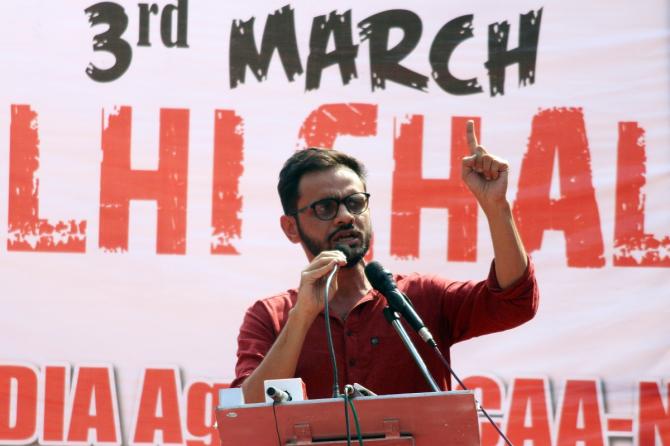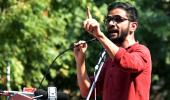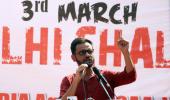The Delhi high court on Friday questioned former Jawaharlal Nehru University student Umar Khalid, arrested in a Unlawful Activities (Prevention) Act case related to the alleged conspiracy behind the riots in New Delhi in February 2020, for using certain words against Prime Minister Narendra Modi in his speech in Amravati.

The high court said some other words could have been used for the prime minister in the speech and the line could have been framed in a better manner.
A bench of Justices Siddharth Mridul and Rajnish Bhatnagar was hearing Khalid's plea challenging a trial court's order which had on March 24 dismissed his bail application in the case.
As the speech delivered by Khalid on February 17,2020, was played in the courtroom, Justice Bhatnagar objected to the use of certain objectionable words used in the speech in Hindi.
"What is this? How can you use the word ... for the prime minister of the country? You could have framed it in a better way. He is making the statement against the prime minister. Some other words could have been used for the prime minister. He could have stopped at...," Justice Bhatnagar said.
Senior advocate Trideep Pais, representing Khalid, said the words were used as a metaphor to show that the real and practical issues of the country were being hidden in reality.
He said Khalid could have stopped but it is not incitement to violence.
"Did Mahatma Gandhi use words like these in his speeches? He is, again and again, saying that we will follow Mahatma Gandhi Ji," the judge said.
To this, the counsel said that in a democratic set up, various methods are used to arrive at a conclusion or to expose what the government is doing and that one such way is by use of words and speeches.
The bench also asked what Khalid means by the word 'inqalab' and 'krantikari' used in his speech.
"We all know the meaning of 'inqalab zindabad'. You used the expressions 'inqalab' and 'krantikari'. What need to see in what context you have used 'inqalab' word," the bench said.
To this, the counsel said it means revolution and added that it is not a crime to use the word revolution.
"I used the word in my speech in the context of people standing against a discriminating law and protesting against it. By no stretch of the imagination the use of the words 'inqalab', 'krantikari', or revolution can be termed as a crime.
"It was a call for an opposition to an unjust law. He did not call for violence. I used the word as a call to boycott an unjust law," he said.
The court listed the matter for hearing further arguments on May 23.
Khalid, Sharjeel Imam, and several others have been booked under the anti-terror law Unlawful Activities (Prevention) Act (UAPA) and provisions of the Indian Penal Code in the case for allegedly being the 'masterminds' of the February 2020 riots, which had left 53 people dead and over 700 injured.
The violence had erupted during the protests against the Citizenship Amendment Act and the National Register of Citizens.
The trial court had dismissed the bail petitions by Khalid on March 24.
Khalid has argued in his bail plea before the high court that his speech, which forms the basis for the allegations against him, did not call for violence, was not contemporaneously uploaded on YouTube, was not widely circulated, and that the allegation of commission of the offence of section 124A (sedition) Indian Penal Code or any reaction in Delhi on account of the speech was 'unfounded, unlikely and more than remote'.
The Delhi Police, represented by Special Public Prosecutor Amit Prasad, has opposed the bail plea, saying the narratives sought to be created by Khalid cannot be looked into as his defence at this stage and the trial court refused to release him by a well-reasoned order which suffers from no illegality.
Earlier, while granting time to the Delhi Police to respond to the bail plea, the high court had said that Khalid's speech was obnoxious, prima facie not acceptable, and that certain statements in the speech were 'offensive per se'.
Besides Khalid, activist Khalid Saifi, JNU students Natasha Narwal and Devangana Kalita, Jamia Coordination Committee members Safoora Zargar, former Aam Aadmi Party councillor Tahir Hussain and several others have also been booked under the stringent law in the case.











 © 2025
© 2025